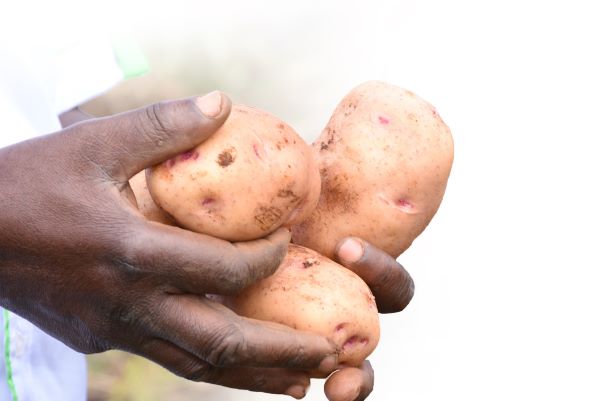Kenya through its research body, the Kenya Agricultural and Livestock Research Organisation (KALRO) has unveiled a new potato variety—Clone IG-70—designed to thrive under drought conditions and resist late blight, a disease that has long plagued potato farmers across the country.
Unveiled during the Mkulima Open Week Exhibitions at the KALRO Potato Research Centre in Tigoni, Limuru, the high-yielding variety is expected to revolutionize potato farming, offering farmers a sustainable solution to declining yields due to climate stress and disease.
“Certified seeds play a crucial role in enhancing potato productivity,” said Robert Musyoki, Director of KALRO Seeds. “This Open Week is not just about unveiling a new variety—it’s about showing farmers the future of agriculture. Clone IG-70 represents that future.”
Musyoki explained that the variety is currently undergoing final verification and will soon be commercially available. He emphasized that awareness and education are key to increasing uptake among farmers. “There’s a huge gap between seed demand and supply. We are calling on stakeholders to join hands in scaling up seed production to meet this growing demand,” he added.
According to Moses Nyongesa, Centre Director at the KALRO Horticulture Research Centre in Tigoni, the new variety is the result of years of research aimed at addressing farmers’ urgent needs. “Farmers have long needed a variety that offers both disease resistance and high yields,” Nyongesa said. “Clone IG-70 delivers up to 320 bags per acre, tolerates drought and blight, and has excellent qualities for processing—especially for chips and roasting.”
To address persistent seed shortages, KALRO is also promoting an innovative propagation technique known as rooted apical cuttings. This technology allows farmers to grow potato seedlings, accelerating early-generation seed production and cutting dependency on traditional seed tubers.
“This method is faster, more efficient, and can be extended to crops like tomatoes,” Nyongesa explained.
However, not all farmers are optimistic about immediate access. At the exhibition, several voiced concerns about the affordability and availability of certified seeds.
“The technology is great, but it’s out of reach for many smallholders,” said Peter Magina, a potato farmer from Limuru. “I only receive two 50kg bags, which is barely enough. We need the government to boost funding for KALRO to scale up production.”
Echoing the same concerns, Rose Wathira, a farmer from Narok, said the cost of a single 50kg bag—Sh4,250—is prohibitive. “The government should subsidize these prices. If the seeds are truly a game changer, then every farmer deserves access,” she said.
Research scientist Faida Kelele John noted that over 80 percent of Kenyan potato farmers still rely on uncertified seeds, making pest and disease control difficult. “Certified seeds like Clone IG-70 undergo rigorous quality checks. They offer consistency and resilience—something informal seed systems can’t guarantee,” she emphasized.
The Mkulima Open Week, running across KALRO research stations nationwide, has drawn hundreds of farmers keen to adopt new technologies to transform their farming practices.
As KALRO continues its push for innovation, Clone IG-70 may just be the breakthrough Kenyan potato farmers have been waiting for.








